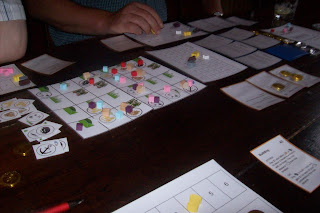Before getting to my own game, I got to play a couple of games of a light card game, which is so close to being something I would buy in a heartbeat, and once through of a midweight Euro game, which I had tried an earlier iteration of, and is well on its way to being a great candidate for my game shelf too. I'm very much looking forward to seeing how both of these turn out.
My game for the day was Drafty Valley, which I had tested a few days earlier as a two player game, and saw that the latest version appeared to be working OK, but seemed weak with only two players. I wanted to see how it fares with more, so was just sitting down as part of a group of three, when a fourth player arrived, making the setup perfect from my point of view.
 |
| Getting close to the end of the game. "What's that you've got there, Grandad?" asks one of the players, spotting that I am using an old camera rather than my phone. |
I got some interesting feedback on the market very quickly, and all three of my testers objected to how it worked. The idea is that there is a marker for each good on a number track, and when you buy a good, you pay the amount to the left of the marker, and then move the marker left, which usually increases the value of that good. Selling works the same, but moving to the right, lowering the value. The feedback I received was that this seemed unintuitive, and the price should just be the value that the marker is on, and then the marker should adjust accordingly.
This is an odd one, as the players were unanimous in this opinion, and they are clearly correct in their opinion that they found it unintuitive (a playtester's perception of something is always correct, even if the conclusion they come to is arguable), but I still disagree that their model would be better than the one that exists. From a thematic point of view I would argue that it makes sense that a merchant would buy something at one price, and sell it at a different (higher) one, and I like this model, so I'll stick with it for a little while longer, but if feedback keeps pointing this way I will get ready to slay this particular darling. It may well be that I just need to make the chart clearer, and describe the values on either side of the marker as the asking price and the offering price, respectively. We'll see...
On a related matter, shipping (being able to sell a big bulk of goods at a single, often lower, price than the general market offers) was barely used and seemed to be unincentivised (ick, that's a horrible, jargony word), in part due to one player taking control of the port at the start of the game. I need to have a think about this (and if it is an action that actually adds to the game), and am considering rolling the shipping action into the same action card as the market trading, as they are thematically related, and reducing the number of cards seems cool to me. Perhaps a better explanation and graphical presentation may help.
There was also a general feeling that people wanted houses to belong to them, rather than just belonging to the board, as with most of the game elements. I think that this is a pity, as I like the general theme of the kingdom being developed as a whole rather than it being about individual players, but I can see where they are coming from, and I think I will have to at least experiment with this, and we talked through a couple of ideas of how this could work.
The final major point, I think, was one that tallies with feedback from a couple of earlier playtests: choosing an action card should give you a decent bonus for choosing it, along the lines of the classic Puerto Rico. So, for instance, if I choose the market trading action, I might be able to do more trades than you are permitted.
The overall theme of feedback from this session was that many aspects of the game just didn't line up with the expectations of the players. Is this because I have made poor design decisions and need to get more sensible, or because I am trying something different and interesting, and should persist, and maybe figure out better ways to present these aspects? I'm hoping that it's not entirely the former, but even if it is, then I can learn from that. I will need to reflect more on this but bear that question in mind as I go through the next stages of development.
In the short term, though, my main priorities are to rework the objective cards pretty much from the ground up and look at the "leader bonus" issue. I think this will almost certainly result in other changes (for instance, I am having a bit of an urge to make a new board, and there's that house ownership thing...) but I have a focus and we'll just see how things go.
Interesting to see your design process like this!
ReplyDeletePersonally I agree that the price of something should be where the marker is at, if only for simplicity.
Building up something "together" however sounds much more immersing than everybody having their own buildings.
Good luck with the design!
Thanks for commenting. I think the argument for simplicity is a strong one, and if the mechanism I like doesn't actually add anything then I must go for the simpler option for the sake of the game.
Delete